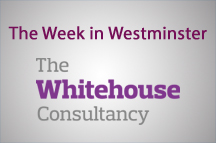 Parliamentarians returned to Westminster on Monday after the long August recess. Whilst expectation for the new term was clear, you could have been fooled into thinking the summer break has changed little: Labour remains embroiled in an existential crisis, whilst the Conservatives’ prevarication on key decisions such as airport expansion and Hinkely Point continues. Oh and Brexit still means Brexit, whatever that means.
Parliamentarians returned to Westminster on Monday after the long August recess. Whilst expectation for the new term was clear, you could have been fooled into thinking the summer break has changed little: Labour remains embroiled in an existential crisis, whilst the Conservatives’ prevarication on key decisions such as airport expansion and Hinkely Point continues. Oh and Brexit still means Brexit, whatever that means.
However, barely five days into the return of both Houses, the Westminster machine is at full speed. There’s been the high-profile resignation of a select committee chair, a potential u-turn on major prison reforms, an accidental leak of the secret education policy announcement planned for party conference season, and proposals to patch up the literal leaks by undertaking a £4bn restoration programme to the Palace of Westminster. Plus ça change, plus c'est la même chose, as they say.
The rules of grammar
The week began with a bang, after an opportunistic Downing Street cameraman snapped confidential briefing papers revealing the government’s intentions to roll-out selective education across England. Since the creation of new grammar schools was banned in 1998, Conservative Party policy in this area has resembled an Ed Balls Strictly routine – full of splits and changes in stance. David Cameron was always lukewarm on the idea of expansion, but with Theresa May now at the helm (herself a beneficiary of grammar education), we can expect that selective schooling will be championed from the very top. This is the first clear manifestation of May’s desire to lead a party that champions equality of opportunity. Expect the phase “a party that works for everyone” – to be repeated ad nauseam during the upcoming party conference.

Fellow grammar school alumnus Jeremy Corbyn chose to entirely ignore the issue during PMQs and led on housing, much to the chagrin of his own backbenchers. However, Labour then tabled an urgent question, providing an opportunity for education secretary Justine Greening to defend the proposals. Shadow education secretary Angela Rayner questioned the underlining rationale - quoting substantial evidence that finds the move would lead to social exclusion. Rayner’s remarks will chime with those of former ministers Lord Willetts, who is convinced that poor children will be frozen-out by selective schooling at age 11, and believe such emotive topics should not distract from more wholesale reform in education. Therein lies the rub for May and Greening – who face an uphill challenge to persuade sceptical Conservatives across both Houses if new legislation on grammars is to ever pass into law.
Hard justice
On Wednesday, the Justice Committee discovered that the Conservatives are looking to row back from a proposed radical shake-up of the prisons system. The Prison and Courts Reform Bill was held up as the centrepiece of last May’s Queen’s Speech, with the then Justice Secretary Michael Gove proclaiming he wanted to give prison governors unprecedented autonomy and to “liberate prisoners through learning”. But the change in ministerial team has prompted a reassessment, with Gove’s successor Elizabeth Truss unwilling to commit to primary legislation. The faltering Bill is illustrative of the shifts in ministerial priorities since the referendum. This ‘new government’ feel can be expected to continue, as May and her colleagues look to chart their own course, rather than follow the route of predecessors.
Moving the furniture
After nearly 14 months of deliberation, Thursday saw the publication of the Joint Committee’s report outlining its recommendation for the restoration of the Palace. It warned of the growing risk of catastrophe unless MPs and peers vacated the building to unable urgent repairs to proceed. The government is expected to back the proposals to move MPs down the road to DoH’s Richmond House from 2023 with the Lords heading to a nearby conference centre - paving the way for six years of remedial repairs.
All to play for in the committee corridors
Whilst the arguments over the cost and time period of Parliament’s repairs will rumble-on, there are more immediate decisions to be made on how the Houses scrutinise government policy following changes to the composition of Whitehall. The merger of DECC with the hollowed-out business department is expected to signal the end of the influential ECC Committee – currently chaired by the SNP’s Angus MacNeil. Meanwhile, the establishment of two new select committees is predicted, mirroring the departments for exiting the EU and international trade. There’s already speculation over which parties will be made responsible for chairing the committees, but it appears unlikely that details will be finalised before the House rises for conference recess on Thursday. The delay builds suspense for backbenchers seeking to run for a chairperson’s role, whilst giving those in the ECC Committee a stay of execution, if nothing more.












